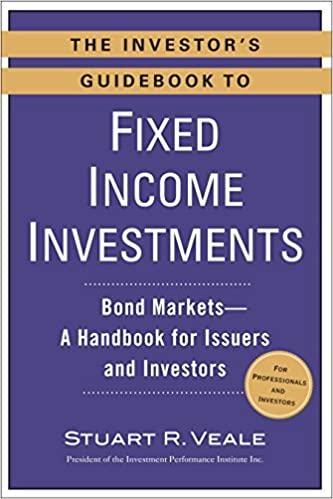Question
Q4 In our discussion of the Dividend Discount Model, we have made the no-bubble assumption: a stock price does not contain a bubble if that
Q4
In our discussion of the Dividend Discount Model, we have made the no-bubble assumption: a stock price does not contain a bubble if
that the no-bubble assumption is not satisfied. Specifically, suppose that stock price 0 can contain two components: the fundamental component = 0[] and the
bubble component 0 that follows the following process: 1 + with probability ;
a) b)
c) d)
e)
(3 points) What is the fundamental price 0 of Zesla? (5 points) What is the distribution of (i) the ex-dividend price 1 one year ahead
and (ii) the ex-dividend price 2 two years ahead? Present your result as (i) 1 = 1 with probability 1, 1 = 2 with probability 2,...; (ii) 2 = 1 with probability 1, 2 = 2 with probability 2,..., where , are numbers that are possibly different in years 1 and 2.
(5 points) You are considering a strategy that sells short 1,000 shares of Zesla now, and then terminate your position in year 2. What is your expected gain or loss? Show all your work.
(6 points) The alternative strategy you are considering is to sell short 1,000 shares of Zesla now, then (i) immediately terminate your position if the bubble bursts in year 1; (ii) terminate your position in year 2 no matter what. What is your expected gain or loss now? Show all your work.
(6 points) Comment on similarities/differences of your answers to c) and d). Only a qualitative explanation or only a mathematical explanation will earn you partial mark. Please provide both explanations for full marks.
(1+)
0 as , where is price years from now and is the equity cost of capital. Suppose instead
+1={ 0 with probability 1 .
The bubble process either grows rapidly or bursts. The more likely it is to burst, the faster it must grow before bursting. At any time , stock price is = + .
Suppose that you are an investor interested in trading Zesla, yet another company that has recently received a cult following. Zesla has recently declared an annual dividend of $1/share paid exactly at the end of each year (so, the first payment will occur exactly a year from now), and it is planning to keep the dividend constant forever. The company has no debt and is not planning any share repurchases. Zeslas equity cost of capital is20%. The current market price 0 of Zesla is $15. You believe that there is a bubble in Zeslas price, and that the probability of the bubble to grow each year is = 50%.
0 =1 (1+)
f)
(5 points, difficult) Yet another strategy you are considering is to sell short 1,000 shares of Zesla now, then (i) immediately terminate your position if the bubble bursts in year 1, 2, 3,...; (ii) immediately terminate your position if the ex-dividend value of your short positions exceeds $100,000 in year 1, 2, 3,.... In other words, you immediately terminate your position in a year in which Zeslas ex-dividend stock price exceeds $100. If you must terminate your position and the bubble is still present, you suffer an additional loss equal to = 50% of the difference between the ex-dividend value of your short positions and $100,000 (e.g., you need to sell some of your other investments at low prices to cover your loss on Zesla). What is your expected gain or loss now? Show all your work.
Step by Step Solution
There are 3 Steps involved in it
Step: 1

Get Instant Access to Expert-Tailored Solutions
See step-by-step solutions with expert insights and AI powered tools for academic success
Step: 2

Step: 3

Ace Your Homework with AI
Get the answers you need in no time with our AI-driven, step-by-step assistance
Get Started


